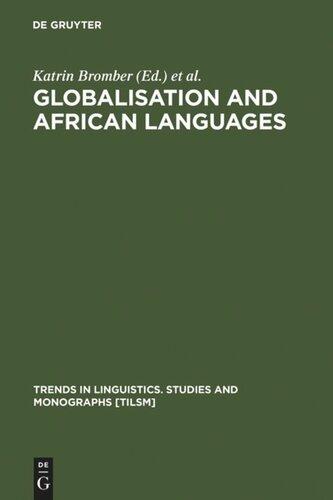

Most ebook files are in PDF format, so you can easily read them using various software such as Foxit Reader or directly on the Google Chrome browser.
Some ebook files are released by publishers in other formats such as .awz, .mobi, .epub, .fb2, etc. You may need to install specific software to read these formats on mobile/PC, such as Calibre.
Please read the tutorial at this link: https://ebookbell.com/faq
We offer FREE conversion to the popular formats you request; however, this may take some time. Therefore, right after payment, please email us, and we will try to provide the service as quickly as possible.
For some exceptional file formats or broken links (if any), please refrain from opening any disputes. Instead, email us first, and we will try to assist within a maximum of 6 hours.
EbookBell Team

4.1
20 reviewsGlobalisation and African Languages links African language studies to the concept of 'globalisation' which increasingly undergoes critical review. Hence, African linguists of various provenience can make valuable contributions to this debate.
In cultural matters, which by definition include language, there is often a sense that globalisation leads to a major trend of homogenisation, which results in a reduction of diversity on the one hand and, on the other, in new themes being incorporated into global (cultural) patterns. However, often conflicting and overlapping particularistic interests exist which have a constructive as well as destructive potential.
This aspect leads directly to the first of three sections of this volume, LANGUAGE USE AND ATTITUDES, which addresses some of the burning issues in sociolinguistic research. Since this research area is tightly linked to the educational domain these important issues are addressed in articles that comprise the second section of this volume: LANGUAGE POLICY AND EDUCATION. The third section of the volume presents articles dealing with LANGUAGE DESCRIPTION AND CLASSIFICATION demonstrating which parts of different language systems are affected through contact under historical and modern conditions.
The contributions of all the well-known scholars in this volume show that globalisation is a two-way street, and to ensure that all sides benefit in a reciprocal manner means the impacts have to be monitored globally, regionally, nationally and locally. By disseminating and emphasising these linguistic findings as part of the global cultural heritage, African language studies may offer urgently needed new perspectives towards a rapidly changing world.